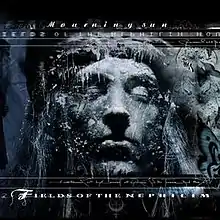Mourning Sun
Mourning Sun, released on 28 November 2005, is the fourth studio album by English gothic rock band Fields of the Nephilim.[1] Vocalist Carl McCoy is the only original band member to be featured on this album and is the bands first studio album since Elizium which was released on 24 September 1990.
| Mourning Sun | ||||
|---|---|---|---|---|
 | ||||
| Studio album by | ||||
| Released | November 28, 2005 | |||
| Recorded | 2002-2005 | |||
| Genre | ||||
| Label | SPV | |||
| Producer | Carl McCoy | |||
| Fields of the Nephilim chronology | ||||
| ||||
Background
McCoy along with John "Capachino" Carter (original Nefilim collaborator) spent eighteen months recording new demos in McCoy's mobile recording studio, dubbed "The Ice Cage" which took them to various places, including Norway. According to McCoy, Ice Cage sessions generated enough material for a double album, yet it was ultimately decided to narrow the track listing down to one disc.
While McCoy has suggested that additional musicians were recruited for the recording process,[2] the only identified persons involved in the writing and recording process to date are John "Capachino" Carter (a musician who also worked with McCoy on Zoon demos in the beginning of 1990's) and McCoy's daughters Scarlett and Eden on backing vocals for the title track. McCoy has admitted to having applied preprogrammed drums on some of the tracks, stressing at the same time that most of the drum parts "were created by a real human being - Carter."[3]
Track listing
| No. | Title | Length |
|---|---|---|
| 1. | "Shroud (Exordium)" | 5:44 |
| 2. | "Straight to the Light" | 6:24 |
| 3. | "New Gold Dawn" | 7:58 |
| 4. | "Requiem (Le Veilleur silencieux)" | 7:21 |
| 5. | "Xiberia (Seasons in the Ice Cage)" | 7:33 |
| 6. | "She" | 9:26 |
| 7. | "Mourning Sun" | 10:35 |
| 8. | "In the Year 2525" (bonus item available only on the limited edition of the album) | 9:28 |
| Total length: | 62:69 | |
Reception
| Review scores | |
|---|---|
| Source | Rating |
| Allmusic | |
| Kerrang! | |
| Maelstrom Zine | |
| Release Magazine | |
| Tartarean Desire | |
Reception to the new album was generally positive, with even the NME listing no less than six of the album's tracks amongst their Top 10 for the band's best songs to date.[8]
Personnel
- Carl McCoy - vocals, programming, producer
- John "Capachino" Carter - bass guitar, guitars, drums, keys & backing vocals
- Scarlett McCoy - backing vocals on "Mourning Sun"
- Eden McCoy - backing vocals on "Mourning Sun"
References
- Allmusic review
- "The people who worked on the demos of "Mourning Sun" are the same musicians who played on the final recordings. The tracks were very long at the beginning, and required important work on their structures and arrangements. In themselves, these things could be defended, no problem at all, but to integrate them into an album would have been too complicated." In D-Side, Issue 31, November–December 2005, interviewed by Emmanuel Hennequin
- "Some of the percussion, situated at the bottom of the mix, was indeed programmed. Other parts were played on line. But for the most part, the rhythmic ones were created by a real human being", from the interview by Emmanuel Hennequin in D-Side magazine, Issue 31, November–December 2005
- "Mourning Sun - Fields of the Nephilim". AllMusic. Retrieved 14 May 2018.
- "Album Review FIELDS OF THE NEPHILIM-Mourning Sun :: Maelstrom :: Issue No 44". Maelstrom.nu. Archived from the original on 6 March 2012. Retrieved 29 August 2012.
- "Fields of the Nephilim: Mourning Sun - Release Music Magazine review". Releasemagazine.net. 19 October 2005. Retrieved 29 August 2012.
- "Fields Of The Nephilim - Mourning Sun - review by Panayiotis Papandreopoulos". Tartarean Desire. 15 August 2008. Retrieved 29 August 2012.
- "Fields Of The Nephilim - news, lyrics, pictures, reviews, biography, videos, best songs, discography, concerts, gossip, pictures and tour dates". Retrieved 2 March 2012.
External links
- Mourning Sun at MusicBrainz (list of releases)